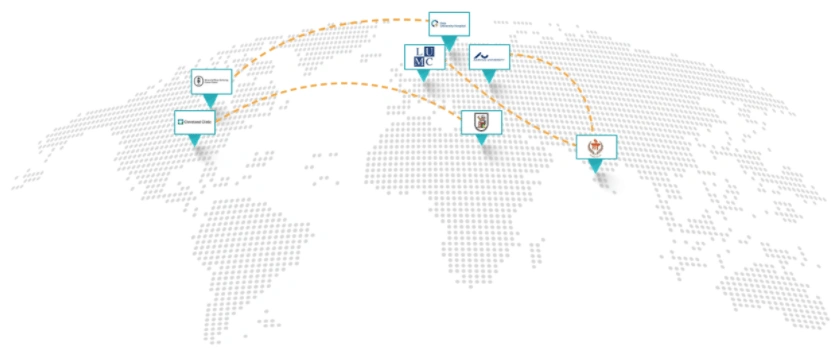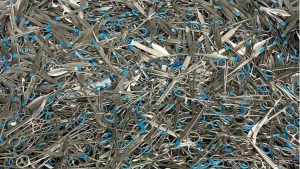Building high-performing OR Teams with ‘Moments-of-Need’
Ritsaart van Montfrans · · 6 min readHow can OR teams become high-performing teams? The OR can be a hectic place, with complex patient cases. How can you make sure that everybody in the team can be a top performer?
Challenges in surgery
Challenges in surgery are large. It’s a big area of activities in the hospital, and responsible for a big part of the budget (often 30%+). As indicated in our earlier blog posts, the challenge is that the clinical outcomes and the efficiency of the surgery teams vary substantially within and between hospitals. Statistics by ICHOM indicate that clinical outcomes can vary between 2x and >5x on key outcome parameters for surgical procedures.
Moreover, it’s a notoriously difficult area to improve. The level of standardisation is low. Surgeons have different ways-of-working to execute surgery, and of course different levels of experience. And OR teams work in a hectic, complex environment, with very limited process support (as described well by Atul Gawande in the ‘Checklist Manifesto’, comparing surgery to other industries).
Connecting 10,000 clinics
So, how to improve in this area? This is of course the topic that we work on at Incision on a daily basis. Our BHAG (our long term Big Hairy Audacious Goal) is to connect 10,000 clinics worldwide to share surgical skills, so every clinic can operate at par with the top clinics in the world.

We work with our clients to make sure that everybody in their teams can contribute to top outcomes in the OR. Help every OR professional to grow to the maximum of their competency. Support teams to run like clockwork. And support teams to run a ‘continuous improvement loop’, learning every day from internal feedback loops and from sharing skills with other hospitals. To do this, teams need ’the right information, for the right person, at the right moment’ .
For this, the Incision platform builds on the 5 Moments of Need method (by Bob Mosher and Conrad Gottfredson). The aim of this method is to improve on-the-job performance of individuals and teams. It focuses on 5 moments to create a strong learning and performance environment: Learn New, Learn More, Apply, Solve and Change. Where ‘on-the-job’ support is often more important than the initial ‘formal learning’. Here is how we do this in the OR, and what improvements we are achieving.
1. Learn New - Learning to do something for the first time
Hospitals use a curriculum for mandatory in-service education. Typically using 1-on-1 teaching, the old master-apprentice. Often with limited technology support, maybe using a Learning Management System. As a result, this is a heavy burden. It requires a lot of time from Supervisors, teachers and admin staff, making it difficult to train many new people. Which is especially difficult when staff turnover is high and many people need to be trained.
At Incision we are working with clients to make learning more effective and efficient. Using technologies to support blended learning, maximum off-patient learning, maximum video content, 3D insights, etcetera with our accredited Academy. Closing the gap between theory and practice as much as we can.
2. Learn More - Expanding your knowledge and skills
There is a big need in the OR for additional learning, with new techniques and devices being introduced continuously. However, hospitals are struggling to find time in their busy schedules to free-up and train OR teams for this. And, increasingly hospitals would like their teams to be flexible so they are better able to create a good OR planning that has the right teams per procedure.
Based on the inputs of our clients, Incision is creating solutions here so teams can ‘always be learning’. Flexible use moments, content in various sizes, interactive quizes, etcetera. Helping our clients to move their teams from ‘must learn’ to ‘wanting to learn’. And always having direct access to the latest information and technology.
3. Apply - Using the knowledge and skills at work
Applying the knowledge in practice can be a big challenge in a hectic OR environment. Of course, hospitals carefully record how procedures should be executed and what items are needed. However, they are not always easy to find for the team that wants to understand the preferences of a surgeon.
Often enough, the flow of supporting work by the OR team is not ideal. IV on the wrong side, ECG stickers misplaced, incomplete instruments, miscommunication about required implants, etcetera. A collection of small things that add up to slow down the pace of an otherwise nicely running team. Resulting in a lot of ’sorry's’ and repair work.
Working closely with our clients, Incision has developed a workflow product that helps teams to better align ahead of OR and during the day. Providing the right information, for the right person, at the right time. Using hospital and surgeon specific information in an easily accessible mobile tool.
4. Solve - Finding solutions for problems
Finding solutions is a core competence in an environment where ‘a day in the OR is always different and unexpected’. Complications occur frequently in surgery, and surgeons and teams are trained to deal with them. But the way teams do this differs a lot between hospitals. OR Managers often indicate that they would like to see more ‘joint problem solving’. Anticipating a patient complication. Or knowing how to deal with equipment malfunction, instead of calling the technical department for help and waste precious time.
Other industries have workflow support tools for this. Procedure and handbooks in airlines for example. But in the OR this is not available.
As part of the Incision workflow tools we have developed, we are including the key pieces of information and communication needed for teams to work in a better way. Knowing what to do with certain error codes. Or better ways to communicate key points from the morning briefing later in the day.
5. Change - Un-learning and re-learning, changing the way you used to work
A core part of ‘Lean Management’ is the ability to improve your way of working. Feedback loops are powerful tools to make small improvement steps every day. ‘Lean’ records the events of the day that you want to ‘Keep’, the ones that are a ‘Problem’, and uses it to define the ’Try’ as an experiment to find a solution for the problem.
Such activities are rare in OR teams. The best teams I have seen capture learning’s every day, and use the learnings in the Daily Briefing the next day. Every day.
At Incision, we are working with these frontrunner teams to understand how this feedback loop can be implemented in a sustainable way. And how hospitals can share best practices between them, as an external feedback loop to get better. Every day.
Curious to know how Incision's platform can help your surgical staff reach their full potential?
Explore 500 high-quality video courses on surgical procedures to prepare for your work, containing a step-by-step methodology in 2D & 3D, master basic principles and skills, anatomy, medical technology, and much more.







